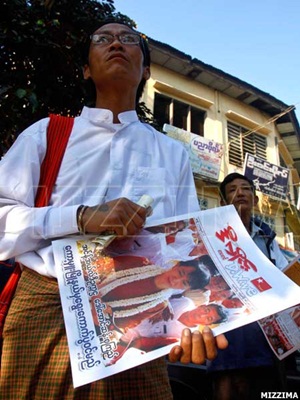The Burmese government’s Press Scrutiny and Development Division (PSRD) has summoned the editors of two political journals after they published material that it said was critical of the government and inappropriate.
 he publisher of the Rakhine Nationalities Development Party’s (RNDP) journal was warned about publishing an article that criticized the change from a military to a quasi-civilian government, RNDP General-Secretary Oo Hla Saw told Mizzima.
he publisher of the Rakhine Nationalities Development Party’s (RNDP) journal was warned about publishing an article that criticized the change from a military to a quasi-civilian government, RNDP General-Secretary Oo Hla Saw told Mizzima.
In the RNDP’s Toetakyay journal published an article on February 29 titled “From a Green Military Uniform Government to a Yellow-Skirt Democracy.”
A passage cited as offensive said: “Something was changing, so I watched the situation and found that the uniforms changed, and I was amazed. Anyway, I’m glad to see the appearance of change. Now the military uniform has changed into Yaw Longyi and a traditional jacket. Later it may be changed into a pale pink skirt and a traditional jacket [for females].”
The PSRD deputy director, Major Tint Swe, issued an order on March 23 summoning journal publisher Myint Naing to a meeting in which he was warned that certain passages were not in accord with the policy of the PSRD and were obscene, according to Oo Hla Saw.
“He said that the words were too harsh, offensive and rude. We had to sign a pledge to mind our language in the future,” Oo Hla Saw told Mizzima. He said the censors also underlined the phrase, “military ogre Ne Win,” warning against such language.
“We’re sorry that they called us in,” said Oo Hla Saw. “It confirms that although the top government officials say that they are implementing reforms, their basic operations have not changed.”
In a related case, the PSRD also summoned Ohn Kyaing, the publisher of the National League for Democracy’s D-Wave Journal concerning a satirical cartoon criticizing the PSRD, which was published in the February issue of the journal.
Nyein Thit, an editor of D-Wave, told Mizzima a cartoon by “Tha Lain Ma” contained a drawing of clouds labeled “Democratic Sky” and a journal named “Freedom of Press,” which was trying to fly [into the Democratic Sky] but it [the journal] was chained to the ground. The chain was labeled, “Press Scrutiny.”
“The cartoon criticizes them,” Nyein Thit said, “and they warned us not to publish a cartoon like that.”
During a state-backed gathering in Rangoon this month called the “Conference on Media Development in Myanmar,” Information Minister Kyaw Hsan said Burma’s media sector would have more transparency and freedom in the future. He noted that President Thein Sein, in an address to Parliament in March 2011, said a new media law is being drafted, but not with the intention of banning or hampering press freedom. “Our aim is to facilitate the proper use of press freedom for the long-term progress of Myanmar’s media sector,” Kyaw Hsan said.
In the West, media criticism of government is considered a basic freedom and a fundamental right in a democratic society.
In contrast to the remarks by top officials, the Ministry of Mines this month filed a libel suit against the weekly news journal, The Voice, which published a story saying that some Burmese government ministries were cited for financial transgressions in a report by the Union auditor-general's office.
The journal’s lawyer, Thein Nyunt, told Mizzima Section 500 of the libel law is used to repress the media, and he will try to revoke the law in Parliament.


